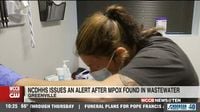RALEIGH – The North Carolina Department of Health and Human Services (NCDHHS) has issued an alert to the public and healthcare providers regarding the detection of mpox virus particles in wastewater samples. This warning comes after routine testing revealed the presence of clade I mpox, a type not previously reported in the state.
So far in 2025, North Carolina has documented two cases of mpox, formerly known as monkeypox. The recent wastewater detections were collected from a treatment plant in Greenville, NC, on March 25, March 28, and April 8. Although no confirmed clade I cases have been reported in the state, the findings suggest that there may be undiagnosed or unreported infections in the area.
“The detection of clade I mpox virus in wastewater surveillance tells us the virus is potentially here in our state, even though no cases have been reported and confirmed,” said NC Health and Human Services Secretary Dev Sangvai. He emphasized the importance of vigilance among healthcare providers and urged individuals at higher risk to consider vaccination.
The mpox virus is primarily transmitted through prolonged close contact, typically skin-to-skin, and is often associated with sexual activity. There are two genetic types of the virus: clade I and clade II. Clade I has been responsible for significant outbreaks in Central and Eastern Africa, particularly spreading through heterosexual contact, with some transmission to household members.
Health officials have assessed that the current risk to the public remains low, but they are urging healthcare providers to remain alert for potential mpox cases. NCDHHS is requesting that providers consider mpox in patients exhibiting compatible symptoms, particularly those who have traveled internationally recently.
“We encourage health care providers to be on the lookout for mpox cases and we encourage people who are at higher risk to protect themselves by getting vaccinated,” Sangvai added. Vaccinations are available to help protect against mpox infection from both clade types and can also reduce the severity of illness if an infection occurs.
The North Carolina Wastewater Monitoring Network, which launched in 2021, plays a critical role in tracking the spread of various viruses across the state. This network collaborates with the University of North Carolina at Chapel Hill, wastewater utilities, and local health departments to collect samples from 35 treatment plants statewide. These samples are tested for several viruses, including SARS-CoV-2 (the virus causing COVID-19), influenza, and respiratory syncytial virus (RSV). Notably, individuals infected with these viruses can still shed viral particles in their stool, even if they do not display symptoms.
While wastewater surveillance has proven to be a valuable tool for public health, the program currently faces challenges due to proposed federal funding cuts. Funding for wastewater surveillance is crucial as it provides an early warning system for infection levels, enabling public health officials and healthcare providers to make informed decisions on preventive measures.
Results from the NC Wastewater Monitoring Network are regularly shared on the NCDHHS wastewater monitoring dashboard, with mpox testing conducted at 18 of the participating sites. Additionally, results are also available on the CDC Mpox wastewater dashboard.
If individuals believe they have mpox or have had close contact with someone diagnosed with the virus, they are advised to consult their healthcare provider or contact their local health department. Symptoms of mpox can include a rash on various parts of the body, including the genitals, hands, feet, chest, face, or mouth. The rash may initially resemble pimples or blisters and can be painful or itchy, progressing through several stages, including the formation of scabs before healing. Some individuals may experience flu-like symptoms before the rash appears, while others may have a rash as the only symptom.
As the situation develops, health officials will continue to monitor the findings from wastewater testing and provide updates to the public and healthcare providers. The presence of mpox particles in wastewater highlights the importance of ongoing surveillance and preparedness in managing potential health risks.
For those in North Carolina, staying informed and proactive about personal health and vaccination can significantly contribute to controlling the spread of mpox and ensuring community safety.

